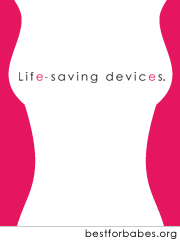In this post: resources, disadvantages of formula & breastfeeding help!

Cal. Labor Code § 1030 et seq. (2001) provides that employers need to allow a break and provide a room for a mother who desires to express milk in private.
Go HERE to see all breastfeeding laws for all 50 states.
The 10 Easy Reasons to Breastfeed (above is the international breastfeeding symbol!)
Available fresh instantly for hungry baby. (no searching for formula & bottle when you have a crying baby)
It's Free!! (cheaper than formula by a long shot)
Effortless pregnancy weight loss. (i could feel my uterus contracting as i was breastfeeding!)
Reduced rates of breast cancer and ovarian cancer for mother.
Decreased risk of SIDS & diseases than formula-fed babies.
Baby's whole body and brain benefit immensely. (breastfeeding protects your baby from illnesses with immunizing antibodies. And scientific studies have shown that the longer babies breastfeed, the greater the intellectual advantage.)
Releases "mothering hormone", prolactin & re
The 10 Easy Reasons to Breastfeed (above is the international breastfeeding symbol!)
Available fresh instantly for hungry baby. (no searching for formula & bottle when you have a crying baby)
It's Free!! (cheaper than formula by a long shot)
Effortless pregnancy weight loss. (i could feel my uterus contracting as i was breastfeeding!)
Reduced rates of breast cancer and ovarian cancer for mother.
Decreased risk of SIDS & diseases than formula-fed babies.
Baby's whole body and brain benefit immensely. (breastfeeding protects your baby from illnesses with immunizing antibodies. And scientific studies have shown that the longer babies breastfeed, the greater the intellectual advantage.)
Releases "mothering hormone", prolactin & re
leases relaxing hormone to baby & mama.
Breastfed babies are leaner.
Easier digestion & less costipation for baby than formula.
Treasure of a lifetime bond with your child.
And these are just a few of the benefits!!
Breastfed babies are leaner.
Easier digestion & less costipation for baby than formula.
Treasure of a lifetime bond with your child.
And these are just a few of the benefits!!

Having problems with breastfeeding??
DID YOU KNOW...if there is pain with breastfeeding something is wrong. Yes this happened to me, the first 2 weeks after my dtr was born, I had nipple pain & they became dry & cracked. Little did I know this is NOT normal. It is a sign something is wrong, so stop & call your lactation consultant right away. 9 times out of 10 it's a latching or positioning problem, that can be easily fixed, so don't wait!! This is one of the most common reasons why mamas stop Bfing & we don't want that! I didn't know until recently that there shouldn't be any pain w/ BFing. I just stuck it out & eventually me & my baby got it right. Don't make my mistake :) HERE's a youtube on how to get the proper latch: http://www.youtube.com/watch?v=Zln0LTkejIs
Always consult an International Board Certified Lactation Consultant (IBCLC). Remember you can't always trust the "white coat". While they ARE Drs, a lot of them aren't trained in BFing. IBCLC's know best. Trust your gut when a doctor gives you breastfeeding or parenting advice (most weren't trained in that either lol). Ask yourself: "Does this feel right for me?" If not get a 2nd opinion!
DO YOU HAVE WIC OR WANT TO??
Through a new program at WIC (Women, Infants & Children) you now have access to Breastfeeding Peer Counselors & IBCLC's for FREE!!!! I am one (peer counselor) & we can help you with all kinds of support/resources & free pumps! Come see us!!!!
KellyMom.com "Breastfeeding and Parenting. Evidence-based information on breastfeeding and parenting issues." She's an IBCLC & can answer a lot of questions!
BestforBabes.org "Beating the Booby Traps that prevent Moms from achieving their personal breastfeeding goals"
Also join Roots Mamas on Facebook, as I said I'm a WIC Breastfeeding Peer Counselor & there I post helpful tips & info on common BFing problems (& solutions *wink*) & converse with other Roots Mamas, join us!!
Breastfeeding information & support lalecheleague.org go on their site to find a local suppot group.
Ever gone to ur doctor & got some info about breastfeeding that just didn't seem right? Thanks to the Academy of Breastfeeding Medicine, you have at your fingertips evidence-based protocols on many breastfeeding topics you can show your doctor HERE. (Including: Mastitis, Supplementation in the hospital, Breastfeeding and co-sleeping, Anti-depressants & breastfeeding & more!) thx Motherwear.com for this awesome resource!!
What about taking medications & breastfeeding? You can still breastfeed while sick & taking most meds. Dr Hale (a pharmacologist who is considered the foremost leading expert in the field of perinatal pharmacology and the use of medications) has written this awesome resource book, Medications & Mother's Milk, that lists every medication & it's level of safety while breastfeeding. Can't buy the book?? Call their help line & they can answer your questions Monday-Friday 8am-5pm central time @ (806)-352-2519. Call them!!
Ever gone to ur doctor & got some info about breastfeeding that just didn't seem right? Thanks to the Academy of Breastfeeding Medicine, you have at your fingertips evidence-based protocols on many breastfeeding topics you can show your doctor HERE. (Including: Mastitis, Supplementation in the hospital, Breastfeeding and co-sleeping, Anti-depressants & breastfeeding & more!) thx Motherwear.com for this awesome resource!!
What about taking medications & breastfeeding? You can still breastfeed while sick & taking most meds. Dr Hale (a pharmacologist who is considered the foremost leading expert in the field of perinatal pharmacology and the use of medications) has written this awesome resource book, Medications & Mother's Milk, that lists every medication & it's level of safety while breastfeeding. Can't buy the book?? Call their help line & they can answer your questions Monday-Friday 8am-5pm central time @ (806)-352-2519. Call them!!
For MORE info see my post on support/resources/free stuff HERE & Breasfeeding Celebs & Videos/Pix HERE
DID YOU KNOW...babies can crawl to the breast after birth!! Check out this AMAZING video: http://www.drmomma.org/2010/04/newborn-breast-crawl.html
Black mamas do breastfeed!! thx Blacktating.com for this awesome collage of photos taken by the Indiana Black Breastfeeding Coalition as part of the Landscape of Breastfeeding Support project. These photos are completely public and can be used by anyone! whatcha think?
Thank you to Hayley Nichols article (below)!!!!!
The Risks and Disadvantages of Formula Feeding c Hayley Nichols
Although breastfeeding is now widely acknowledged to be the ideal for babies, and the World Health recommendation is for a minimum of 6 months exclusive breastfeeding, the choice of how to feed a baby is often still framed as one between two equally valid alternatives.
In fact, breastmilk is not "ideal" but the normal, natural food for babies, adapted over millions of years to meet their unique nutritional and immunological needs. Formula, in comparison, has only been around for about 150 years, and its long-term results are still being studied.
Nutrients in Formula Versus Nutrients in Breastmilk
All the nutrients in breastmilk are in perfect balance and the infant can also regulate its own intake, and therefore its weight gain, in a way that is impossible with formula-feeding, according to Successful Breastfeeding [Royal College of Midwives, 2002]. Deviating from this "gold standard" carries risks to the health of both mother and child.
Risks of Formula Feeding For Infants and Children:
The effects of formula feeding on infants and children continue to be studied, and several significant risks have been identified. There is an increased risk of:
- Mortality – this applies in Western countries as well as developing countries. For example, according to Lucas and Cole (1990), if all the preterm babies in British neonatal units were fed breast milk rather than formula, 100 deaths a year from necrotising enterocolotis would be prevented.
- Asthma and allergy
- Acute respiratory disease
- Childhood cancers
- Nutrient deficiencies: e.g., fatty acids, essential for brain development, and amino acids, essential for central nervous system development, as well as calcium and iron, are not in the correct proportions and/or as easily absorbed from formula as breastmilk.
- Infection from contaminated formula
- Diabetes
- Chronic diseases
- Cardiovascular disease
- Gastrointestinal infections
- Otitis media – inflammation of the middle ear
- Urinary infections
- Sudden infant death syndrome
- Necrotising enterocolotis – an infection or inflammation that causes destruction of the bowel or part of the bowel.
as well as
- Reduced cognitive development
Disadvantages of Formula Feeding For the Mother:
If a mother feeds her baby formula rather than breastfeeding, this has an effect on her health too. There is an increased risk of:
- Breast cancer – the risk of breast cancer is decreased by 4 % for each year of breastfeeding, according to D Hollander in Breast cancer Risk is Reduced By 4 % for Each Year of Breastfeeding [International Family Planning Perspectives, Vol. 28, 2002].
- Being overweight
- Ovarian cancer and endometrial cancer
- Osteoporosis
- Reduced natural child spacing, putting more pressure on the woman’s body and causing general stress, particularly in developing countries where resources are scarce
- Rheumatoid arthritis
- Stress and anxiety
- Diabetes
Normalisation of Formula Feeding
It is only in a small minority of cases that formula is medically necessary, according to the Royal College of Midwives, and a woman should be encouraged and supported to breastfeed for as long as she wishes. It is extremely rare for a woman to be physically unable to breastfeed, and most problems in breastfeeding are caused by a lack of support and accurate information.
However, formula feeding has become normalised through years of inaccurate information about breastfeeding, because of the vested economic interests of formula companies, and due to the sexualisation of breasts in our culture [Gabrielle Palmer, The Politics of Breastfeeding,New York University Press, 1993]. Fears about breastfeeding in public can be a significant deterrent to many women, but this can be overcome.
Organisations such as La Leche League offer localised support for breastfeeding mothers, and there are also helplines and groups where mothers can meet other breastfeeding mothers.
World Health Organisation Recommendations for Infant Feeding
WHO recommendations are for an infant to be given only breastmilk for 6 months, and for breastfeeding to continue for two years of age or beyond. If a baby is not breastfed, formula is required for the first year of life. Many mothers are not fully aware of the risks of formula feeding and so are making a choice without the necessary information.
References:
Infant Feeding Action Coalition Canada Breastfeeding Information Resource Centre. Risks of Formula Feeding Brochure
A. Lucas and T.J. Cole (1990). Breastmilk and Necrotising Enterocolotis. Lancet 336: 1519-1523.
Copyright Hayley Nichols.
Read more at Suite101: The Risks and Disadvantages of Formula Feeding: Facts About Breastmilk Substitutes Used in Bottle-Feeding Infants http://www.suite101.com/content/the-risks-and-disadvantages-of-formula-feeding-a85064#ixzz17jL3NOQs

















No comments:
Post a Comment